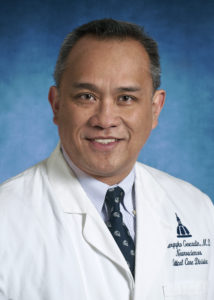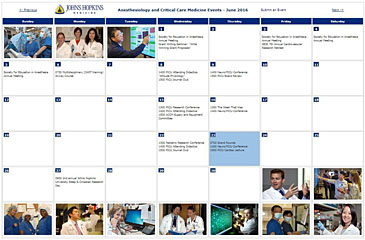 Dr. Romergryko G. Geocadin is Professor in the Department of Anesthesiology-Critical Care Medicine, Department of Neurology, and Department of Neurosurgery, with a joint appointment in the Department of Medicine of the Johns Hopkins University School of Medicine. After completing his medical education in the Philippines, residency at NYU, and fellowship at Johns Hopkins, Dr. Geocadin now specializes in neurocritical care medicine at Johns Hopkins. Presently he is the chairman of the multidisciplinary critical care practice committee at Johns Hopkins Bayview and co-director of the Johns Hopkins Encephalitis Center. He was previously the Director of the Neurosciences Critical Care Unit at Johns Hopkins Bayview and was the Director of the Division of Neurosciences Critical Care at Johns Hopkins.
Dr. Romergryko G. Geocadin is Professor in the Department of Anesthesiology-Critical Care Medicine, Department of Neurology, and Department of Neurosurgery, with a joint appointment in the Department of Medicine of the Johns Hopkins University School of Medicine. After completing his medical education in the Philippines, residency at NYU, and fellowship at Johns Hopkins, Dr. Geocadin now specializes in neurocritical care medicine at Johns Hopkins. Presently he is the chairman of the multidisciplinary critical care practice committee at Johns Hopkins Bayview and co-director of the Johns Hopkins Encephalitis Center. He was previously the Director of the Neurosciences Critical Care Unit at Johns Hopkins Bayview and was the Director of the Division of Neurosciences Critical Care at Johns Hopkins.
As a clinician-scientist, his research focuses on the mechanisms and treatment of acute disorders of consciousness in the ICU, with emphasis in brain injury after cardiac arrest. Dr. Geocadin’s laboratory and translational research has been funded by the National Institutes of Health (RO1, R21, R43 and R44 grants in collaboration with Dr. Nitish Thakor of JHU-BME), the American Heart Association and American Academy of Neurology. His translational and clinical research has provided key insights on early neurophysiologic mechanisms of acute coma recovery and the impact of temperature management/therapeutic hypothermia on coma recovery and prognostication. His other areas of research interest include diagnosis and treatment of encephalitis, status epilepticus, and large strokes (ischemic and hemorrhagic) in the ICU.
As a member of the Science Committee of the Emergency Cardiovascular Care Committee of the American Heart Association (AHA) and the Adult Research Task Force of the Get with the Guidelines Resuscitation, he has published several AHA statements, guidelines and high impact scientific articles related to cardiac arrest resuscitation. He was a panelist/speaker for the Institute of Medicine (IOM) of the National Academy of Sciences Committee on Treatment of Cardiac Arrest: Current Status and Future Directions. Dr. Geocadin is chair of the practice guidelines writing group on Brain Injury and Cardiac Arrest for the American Academy of Neurology
Dr. Geocadin has published extensively in peer-reviewed journals and he serves on the editorial board of the journals: Resuscitation, Neurocritical Care, Seminars in Neurology, and Critical Care Practice and Research. He was guest editor for Neurology Clinics, Critical Care Clinics, and Emergency Medicine Clinics of North America. He has been elected fellow of the American Academy of Neurology, American Neurological Association and the Neurocritical Care Society. He is the President-elect of the Neurocritical Care Society (NCS) and chairman of the 2014 Annual Meeting of the NCS.
Professional Activities
- Neurocritical Care Society
- American Heart Association
- American Academy of Neurology
- Society of Critical Care Medicine
Selected Publications
- Geocadin RG, Buitrago MM, Torbey MT, Chandra-Strobos N, Williams MA, Kaplan PW. Neurologic prognosis and withdrawal of life support after resuscitation from cardiac arrest.Neurology 2006; 67(1):105–8, 2006.
- Geocadin RG, Koenig MA, Stevens RD, Peberdy MA. Intensive care for brain injury after cardiac arrest: therapeutic hypothermia and related neuroprotective strategies. Crit Care Clin 22(4):619–36, 2006.
- Geocadin RG, Stevens RD (eds). Critical Care Clinics: Neurologic Critical Care. Philadelphia: Elsevier Press vol. 22, issue 4, 581–828, 2006.
- Geocadin RG (ed). Seminars in Neurology: Hypoxic Ischemic Encephalopathy. New York: Thieme Medical Publishers. vol 26, issue 4, 367–452, 2006.
- Koenig MA, Bryan M, Lewin JL 3rd, Mirski MA, Geocadin RG, Stevens RD. Reversal of transtentorial herniation with hypertonic saline. Neurology 70(13):1023–9, 2008.
- Jia XF, Koenig MA, Shin H, Zhen G, Thakor NV, Geocadin RG. Early electrophysiologic markers predict functional outcome associated with temperature manipulation after cardiac arrest in rats. Crit Care Med 36(6):1909–16,2008.
Honors
- Selected Delegate, Neurology Leadership Forum of the American Academy of Neurology (2003)
- Corporate Roundtable Clinical Research Training Fellowship Award, American Academy of Neurology-Education & Research Foundation (2000–2002)
- Postdoctoral Fellowship Award, American Heart Association–Mid-Atlantic Affiliate (1999)
- David S. Dana Research Award, Johns Hopkins Neurocritical Care Division (1999–2000)
- Eleanor Naylor Dana Neuroscience Critical Care Fellowship Award, Johns Hopkins Neurocritical Care Division (1997–1998)
- Scholarship for Residents at the 48th Annual Meeting of the American Academy of Neurology, San Francisco, CA (1996)
